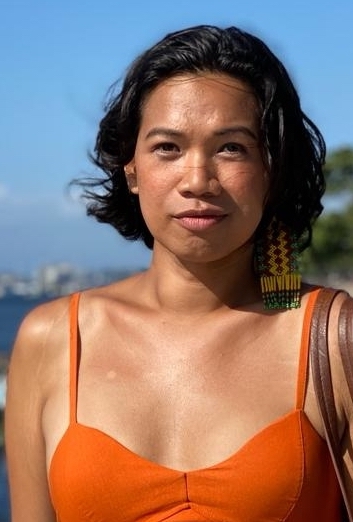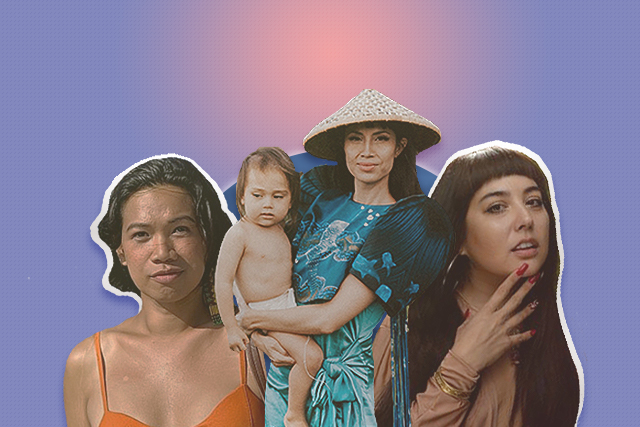It’s far easier to focus on our differences, on the hyper specifics of the issues faced by our micro-communities, than face the reasons why our hurdles are interconnected. In the case of the Filipinx discourse and the mutual “othering” between mainland and diasporic movements, what’s the bigger picture that often eludes us?
We had a chat with three Filipinos based abroad on the significance of embracing diversity in decolonization, TERFs and other things we need to scrutinize if we want to move forward.
Khara Jabola-Carolus is the executive director of the Hawaiʻi State Commission on the Status of Women, the main policy advisor to lawmakers on women’s rights and gender justice and a central resource hub for women across the state. Stephanie Gancayco is a nonbinary creative director, designer as well as founder and editor in chief of Hella Pinay, a queer-led independent media and events collective based in California. Dr. Jaya Jacobo is a trans scholar, poet, activist and community worker whose scholarly work is committed to decolonizing transness through herstory of gender diversity in the global south.
Here’s how our conversation went.
What are your thoughts on the criticism that Filipinx is a product of diaspora disconnect?
Jaya: The “x” in “Filipinx” is inspired by the “x” in “Latinx” and “Chicanx.” Filipinx, Latinx and Chicanx communities in the US converse with each other and compare experiences not only because of their shared American diasporic condition but also from the legacies of Spanish colonialism in the Philippines, Mexico and most of Latin America. The signifier opens up the notion of identity to nonbinary people who don’t feel they’re represented by the dualism most apparent in the Spanish “a/o,” which mark out people according to “female” or “male” only. The “x” is also related to pronominal choices that refuse the gender binary such as the singular plural “they/them/theirs.” Finally, it speaks to the asterisk in “trans*,” which seeks to include not only transsexual people but also transfeminine/transmasculine, transvestite/cross-dresser, genderqueer, gender-fluid, gender-creative, gender-nonconforming, gender-questioning, and nonbinary identities that can’t be categorized by the markers of “trans woman” or “trans man.” The “x” and the “*” speak to a diversity that has been repressed by colonial and capitalist orders and a variance that seeks to resist these systems of erasure.

Stephanie: I’ve questioned having a magazine with “pinay” in the title, since members of our staff and contributors are also GNC (gender-nonconforming) folk and queer cis men. There’s so much that can be coded into the words we use, and those meanings are constantly shifting. But I do feel that these terms can be signifiers—like using “pinay” in our title can signify that we’re dealing with the more femme-ish side of Filipino identity things and representation. I personally identify as a nonbinary femme, and I’ve always used the term Filipino to refer to myself.
I do agree that Filipinx seems to signify that we’re talking about diasporic identity… so I feel like, maybe that is the signal of the diasporic disconnect. Wanting to have language that encompasses diasporic identities is totally OK and valid. Many Filipinos in the diaspora have never been to the Philippines, or don’t speak the languages, but they can’t be faulted for that if they were raised elsewhere, ya know? We’re all just out here trying to make sense of who we are using our very limited human perspectives and language and experiences.
Jaya: From the exchanges I’ve had with diasporic Filipinx, I never had the impression that they were disconnected from the Philippines. In the spirit of dialogue, perhaps we should also ask if we’re willing enough to learn from our diasporic kin, and engage in a conversation with them on this crisis of identity. I also don’t agree that they’re imposing the usage of “Filipinx” in the Philippines. If Filipinxs in the Philippines have embraced such a marker, I’ve observed that they do so volitionally, without coercion at all, and with a high level of articulation. Why do we assume Filipinx in the Philippines can’t localize their own understandings of nonbinarity?
Can the terms Filipino/a/x exist in the same space without compromising any of the fights of marginalized identities?
Khara: Culture is never finished. Culture is a living and evolving thing so I don’t think we should be too dogmatic and police each other harshly on the term Filipinx especially if it’s reducing transgender discrimination against Fil-Ams. Frankly, the first part of the word, before the o/a/x, is also problematic because we are namesakes of a white man (King Philip II).
Stephanie: As a nonbinary femme, I personally use Filipino to describe myself, I think it’s about just letting people live. If I want to be Filipino today and Filipinx tomorrow and Filipina the day after that, that language doesn’t change who I am at my core or my identity or the purpose behind the work that I do.
View this post on Instagram
Jaya: If a Filipina or Filipino refuses the “x,” or if a person in Bontoc or Zamboanga refuses “Filipina/o” altogether, then so be it. One cannot legislate identity. We must remember nationalist discourses have a tendency to deface diversity, just to uphold republican values. “Filipina/o” may not speak to Moro and/or indigenous identities who have historically resisted imperial and republican forms of governance from the peripheries. We should listen to them and learn from their stories of [suffering] and resistivity.
There are people who consider Filipinos as Hispanics or Pacific Islanders rather than Southeast Asians. Does this in any way affect how Filipinos living abroad respond to the rise of campaigns against Asian American and Pacific Islander (AAPI) hate crimes and microaggression?
Stephanie: Earlier this week I was actually talking with my managing editor, Pia Cortez, who’s based in Pampanga, and we were talking about this idea of Asian solidarity and how in actual Asia, like… Asian solidarity is a totally different thing because it’s all totally different countries and cultures with long histories of conflict and trade and all that. But in the US diaspora, we tend to group together (or get grouped together) as “Asian Americans” because we or our ancestors all migrated from countries that are relatively geographically close to one another. So like when people talk about “Asian culture”… what’s that exactly? It really smooshes together and erases so many complex identities, cultures, cultural values and histories.
Khara: There is a push to disaggregate AA and PI, and Filipinos are caught in the middle. People have a hard time allowing someone to exist as multiple things at once, and racial/ethnic labels confer resources in the US, so Filipinos feel the need to pick one. There was a viral post last year calling Filipinos posers who identify as Pacific Islander and insisting that it’s a settled fact that we are Asian. It reminded me of the ilustrado disavowal of indigeneity/Indigenous Filipinos in the late 1800s because they wanted to earn favor in the eyes of outsiders and associate with “high” Asian civilizations. [But] when I see some of our cultural traditions, myths and food alongside Native Hawaiians, it makes more sense for us to identify as Pacific Islanders than Asian. We are still in the process of defining who we are for ourselves so let’s be gentle to one another.
View this post on Instagram
Jaya: “Hispanic,” “Pacific Islander” and “Southeast Asian” all describe the cultural diversity of Philippine identities, but one term cannot describe us in exclusive terms. Why fetishize a complex phenomenon such as identity? Are we courageous enough to leave behind national modes of belonging and explore transcultural relations the way Austronesians exchanged not only goods but also traditions prior to the age of empire? Identity is not monolithic; it is intersectional. It encompasses gender, class, race, ethnicity, religion; I am not just a trans woman, I am also many things at the same time. I refuse to be limited by my own transness, whether by cis people or my own community. Intersectionality makes us reflect on anti-Asian and Pacific Islander violence in the US in relation to African American oppression and Native American marginalization. We might be complicit in that power if we don’t envision solidarity among us, the singularly oppressed.
Stephanie: It does of course hit closer to home when hate crimes are being committed against people who look like my family members, but… the root of this is white supremacy and imperialism and capitalism, and we all need to fight against these issues together.
What does the Filipino women’s movement abroad look like?
Khara: The Filipino women’s movement abroad is very active. One of the key issues is implementing a feminist recovery from the COVID-19 crisis for the United States, and in a way that advances a change in the power dynamic between our countries. We led the first government agency in the world to propose a feminist economic recovery plan. This is a comprehensive transition plan to move beyond capitalism and benefit Filipino women everywhere. Filipino women also co-founded the largest revolutionary socialist, anti-imperialist feminist organization active in the United States today: AF3IRM. AF3IRM represents an alternative to liberal, American feminism. One of their main campaigns is taking control back over our bodies and territories by ending the sex industry, while supporting the “workers.”
View this post on Instagram
Jaya: The Filipino women’s movement in the Philippines and abroad cannot be described in such a cohesive manner, for the global feminist project is itself a plural one. What is not talked about? Trans exclusionary radical feminists (TERFs) within nationalist and diasporic feminisms. There are Filipinas at home and abroad who do not see trans women as women. They believe in essentialist notions of the female body that menstruates, gives birth to an offspring and goes through menopause; “woman” is a fixed category for them, a failure of their so-called feminist critique; they can only affirm cisheteropatriarchal models of gender hierarchy that defeats in the end their war against empire. In the end, it’s all reduced to biological determinism.
In a forum dedicated to Jennifer Laude, they wouldn’t even utter “trans women.” There could only be microaggression in a turn of phrase such as “women and trans.” TERFs are also prevalent in contemporary queer discourse. Despite the current critical lexicon, there are still cis gay and lesbian activists who refer to cis women as “genital women.” As early as the late 1960s, these practices of exclusion have already been pointed out by Marsha P. Johnson and Sylvia Rivera, trans pioneers of the Stonewall Uprising. This is why we women of trans circumstance turn to trans feminist allegiances across distinctions of race, ethnicity, class and religion; we transcend the nation to foster dialogue among sisters elsewhere who have also been ostracized by cis women. I have learned so much from my engagement with travestis and transsexual women in Brazil, especially Mariah Rafaela Silva, Jaqueline Gomes de Jesus, Sara Wagner York, Viviane Vergueiro, Wescla Vasconcelos, Indianara Siguiera and Linda Brasil.
As a Filipinx/a who’s living/has lived abroad, are there things that you feel need to be reconciled to further connect the Filipino women’s movement abroad and in the Philippines?
Stephanie: I think that in general, we are super disconnected from each other. I feel like so many Fil-Ams have a lot of preconceptions and stereotypes about the Philippines and vice versa, and I don’t think that’s entirely peoples’ faults. A lot of it is about access and what they’re shown in the media. If you don’t have a deep understanding of an issue there can be this tendency to idealize, coming at it from a colonizer savior perspective that I think can be really dangerous. Maybe it’s about listening more to each other’s experiences, learning more about the historical and cultural things that have shaped those experiences, instead of trying to march in and be like, “I know everything and I know the right way to do things.”
Khara: The Reaffirmists/Rejectionists split is still haunting us and inherited by each successive generation of activists, which maintains fault lines in the movement. I’d like to be part of the generation that struggles toward resolve, without glossing over the history and tensions.
Filipinx/a should strive to be more conscious of the way their Americanization, citizenship privilege and inculcation of liberal values shapes their activism. I have noticed some Filipinx/a break with the political line of their mother organization in the Philippines on the issue of the sex trade and think it’s okay because they know better. Sex work is just a career choice or a personal choice that labor rights, unionization and removing the hand of the state will make safe. They are romanticizing a bad industry and individualizing a structural problem because that’s the liberal feminist, American approach to social issues.
View this post on Instagram
Jaya: I highly recommend the digital handles of the Society of Transsexual Women of the Philippines, which has become a global alliance of Filipina trans women; the scholarly writings of Ferdie Lopez (Canada), Brenda Rodriguez Alegre (HK), Joy Cruz (HK) and Mikee Inton-Campbell (Aotearoa/New Zealand); the community engagement of Rica Paras (UK), Dee Mendoza (UK), Kaye Candaza (the Netherlands), Charlese Saballe (Finland), Hender Grecio (Hungary), Meggan Evangelista (Hungary), Yesha Tolentino (Belgium), Maria Carmen Hinayon (US), TS Jane (US), Heart Diño (Cambodia) and Adri Pangilinan (Australia); and the creative interventions of filmmaker Isabel Sandoval, writer Meredith Talusan, supermodel Geena Rocero, actress Rain Valdez and writer Elena Rose Vera in the US, writer Stefani Alvarez in the Middle East and performance artist Bhenji Ra in Australia. These Filipina women in the diaspora are marvelous in their vision of a gender-diverse future.
Art by Pammy Orlina
Follow Preen on Facebook, Instagram, Twitter, YouTube and Viber
Related Stories:
Unpacking the history of the word ‘Filipina’ and the local women’s movement
6 trans and nonbinary professionals on navigating the working world
Hey, transphobia isn’t just a matter of a ‘difference of views’
We asked 7 Filipinas about therapy and their best mental health advice


